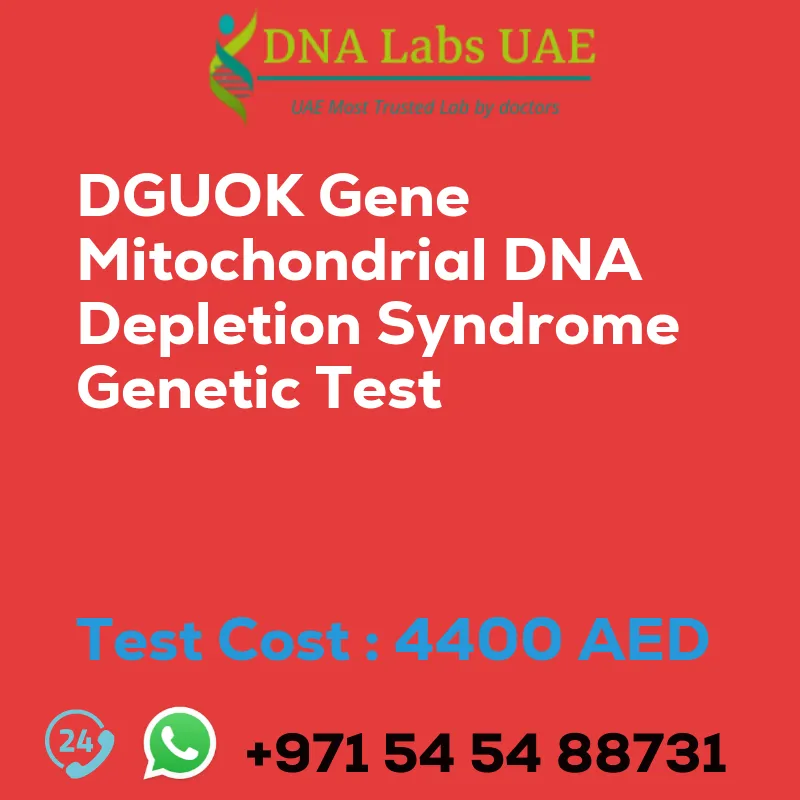DGUOK Gene Mitochondrial DNA Depletion Syndrome Genetic Test
Components:
- Test Name: DGUOK Gene Mitochondrial DNA Depletion Syndrome Genetic Test
- Price: 4400.0 AED
- Sample Condition: Blood or Extracted DNA or One drop Blood on FTA Card
- Report Delivery: 3 to 4 Weeks
- Method: NGS Technology
- Test Type: Neurological Disorders
- Doctor: Neurologist
- Test Department: Genetics
Pre Test Information:
Clinical History of Patient who is going for DGUOK Gene Mitochondrial DNA Depletion Syndrome NGS Genetic DNA Test. A Genetic Counselling session to draw a pedigree chart of family members affected with DGUOK Gene Mitochondrial DNA Depletion Syndrome.
Test Details:
DGUOK gene mitochondrial DNA depletion syndrome NGS genetic test is a type of genetic test that analyzes the DGUOK gene for mutations or variations that may be associated with mitochondrial DNA depletion syndrome.
Mitochondrial DNA depletion syndrome is a rare genetic disorder characterized by a reduction in the amount of mitochondrial DNA (mtDNA) in the body’s cells. This reduction can lead to impaired mitochondrial function, which can affect various organs and systems in the body.
The DGUOK gene provides instructions for producing an enzyme called deoxyguanosine kinase, which is involved in the synthesis of mitochondrial DNA. Mutations in the DGUOK gene can impair the enzyme’s function, leading to mitochondrial DNA depletion syndrome.
NGS (Next-Generation Sequencing) is a high-throughput sequencing technology that allows for the analysis of multiple genes simultaneously. In the case of DGUOK gene mitochondrial DNA depletion syndrome NGS genetic test, it involves sequencing the DGUOK gene to identify any mutations or variations that may be present.
This genetic test can be useful in diagnosing mitochondrial DNA depletion syndrome and providing information about the specific genetic cause of the condition. It can also help in identifying carriers of the gene mutation and providing genetic counseling to affected individuals and their families.
It is important to note that genetic testing should always be done under the guidance of a healthcare professional, and the results should be interpreted in the context of the individual’s medical history and symptoms.
| Test Name | DGUOK Gene Mitochondrial DNA depletion syndrome Genetic Test |
|---|---|
| Components | |
| Price | 4400.0 AED |
| Sample Condition | Blood or Extracted DNA or One drop Blood on FTA Card o |
| Report Delivery | 3 to 4 Weeks |
| Method | NGS Technology |
| Test type | Neurological Disorders |
| Doctor | Neurologist |
| Test Department: | Genetics |
| Pre Test Information | Clinical History of Patient who is going for DGUOK Gene Mitochondrial DNA depletion syndrome NGS Genetic DNA Test A Genetic Counselling session to draw a pedigree chart of family members affected with DGUOK Gene Mitochondrial DNA depletion syndrome |
| Test Details |
DGUOK gene mitochondrial DNA depletion syndrome NGS genetic test is a type of genetic test that analyzes the DGUOK gene for mutations or variations that may be associated with mitochondrial DNA depletion syndrome. Mitochondrial DNA depletion syndrome is a rare genetic disorder characterized by a reduction in the amount of mitochondrial DNA (mtDNA) in the body’s cells. This reduction can lead to impaired mitochondrial function, which can affect various organs and systems in the body. The DGUOK gene provides instructions for producing an enzyme called deoxyguanosine kinase, which is involved in the synthesis of mitochondrial DNA. Mutations in the DGUOK gene can impair the enzyme’s function, leading to mitochondrial DNA depletion syndrome. NGS (Next-Generation Sequencing) is a high-throughput sequencing technology that allows for the analysis of multiple genes simultaneously. In the case of DGUOK gene mitochondrial DNA depletion syndrome NGS genetic test, it involves sequencing the DGUOK gene to identify any mutations or variations that may be present. This genetic test can be useful in diagnosing mitochondrial DNA depletion syndrome and providing information about the specific genetic cause of the condition. It can also help in identifying carriers of the gene mutation and providing genetic counseling to affected individuals and their families. It is important to note that genetic testing should always be done under the guidance of a healthcare professional, and the results should be interpreted in the context of the individual’s medical history and symptoms. |








